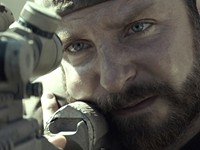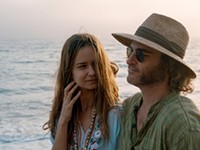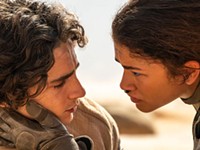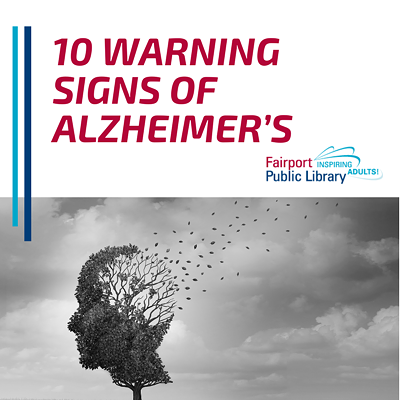[
{
"name": "500x250 Ad",
"insertPoint": "5",
"component": "15667920",
"parentWrapperClass": "",
"requiredCountToDisplay": "1"
}
]
Although throughout its history the cinema has offered numerous examples of films about artists of all sorts, writers seem the least congenial subjects for the camera. Composers, musicians, painters, sculptors, actors, dancers, even filmmakers themselves provide rich visual material for any director. The actual methods and practices of creation in the graphic, plastic, and performing arts are intrinsically fascinating, and American film handles the concept of sheer process with remarkable skill.
Writers, however, present a difficult challenge for any director; simply put, the act of writing is not at all glamorous or colorful. Most of it consists of long, lonely hours spent scratching one's head and looking vaguely into the middle distance, searching for a word, hoping for an idea. Once in a while a film will illustrate a story coming to life — one of the best sequences in "The World According to Garp" shows a series of images from which the title character weaves an eccentric, touching narrative — but few movies sustain such moments for any significant length.
In "The Words," a picture entirely about writers and writing, a series of stories that overlap, intersect, and merge into each other provides the framework for an essentially interior and even meditative cinematic essay. The movie employs several different methods of telling its story, and ingeniously, in the best Modernist manner, even in effect invites the audience to participate in the completion of its narratives.
It begins with an author, Clay Hammond (Dennis Quaid) reading parts of his novel to a large and rapt audience, then moves smoothly into a visualization of his fiction, a work about a struggling young writer, Rory Jansen (Bradley Cooper), enduring the familiar blizzard of rejection slips from agents and publishers, who for one reason or another will not accept his novel. He finds a manuscript in an old briefcase that he and his wife buy in Paris and, not really knowing why, decides to copy it verbatim on his computer. When his wife (Zoe Saldana) reads it, she insists that he submit it to the agency where he works in the mailroom; the agent loves it, the book, "Window Tears," becomes a grand critical and commercial success, winning prizes, earning a great deal of money, and guaranteeing publication of his previously rejected work.
When the film shifts back to Hammond's reading, another character, simply identified as The Old Man (Jeremy Irons), enters the story; he stalks Rory, finally accosting him in Central Park, and identifies himself as the real author of "Window Tears." He tells Rory yet another story, explaining the context of his own creation and the loss of the manuscript, reminiscent of an actual event in Hemingway's life. Consumed by guilt, Rory tries desperately to make amends, but The Old Man wants nothing from him beyond the need to disburden himself of his past and perhaps to read him an unwritten book of pain and sorrow.
Moving through various levels of fiction, alternating between Clay Hammond's reading, the dramatization of Rory Jansen's life, the further dramatization of The Old Man's youth, the movie suggests some of the many options in the working out of the main narrative. Hammond even invites a lovely graduate student groupie (Olivia Wilde) to finish the novel herself, ending the picture with an ironic ambiguity entirely appropriate to its confusions of fictional life and real life.
True to its title, "The Words" concentrates a good deal of attention on words and their relation to reality, with a number of discussions of the subject, resulting quite naturally in a certain talkiness. Its deft handling of a complex subject and a convoluted narrative, however, avoids any descent into boring literary lectures. The performances vary oddly, with Dennis Quaid providing a strangely prissy delivery of his perfectly acceptable lines. Surprisingly, Bradley Cooper handles the complicated situation of a man whose dreams come true, but feels devoured by his guilty knowledge that he deserves none of his success; on the other hand, his scenes with Zoe Saldana ooze a mushy sweetness. Bitter, defeated, profane, Jeremy Irons does a remarkable job as The Old Man, a terrific piece of work in a supporting role that also somehow explains the meanings of the movie.
Latest in Movie Reviews
More by George Grella
-

Film Review: "Cake"
Jan 26, 2015 -

Film Review: "American Sniper"
Jan 19, 2015 -

Film Review: "Inherent Vice"
Jan 12, 2015 - More »






